Greg Fisher: Providing the Secret Sauce
Published on May 1st, 2019
As a former Collegiate All-American, World Champion and world-renowned expert in the sailing community, Greg Fisher has checked a lot of boxes in his sailing career. Recently named the Chief Operating Officer of Olympic Sailing, Scuttlebutt editor Craig Leweck checks in with Greg for an update.
You were hired for a new position. How did this come about?
Malcolm Page, who is the Chief of Olympic Sailing for USA, is an incredible coach and leader and obviously an incredible sailor, but his plate was over filled.
While there is a tremendous staff surrounding him in Meredith Brody, Kate Drummey, Leandro Spina, and a host of others within US Sailing, the activity within the program is full on right now. This isn’t just about preparing for Tokyo 2020; this is also about making formative changes for the future of the program looking towards 2024 and 2028.
I saw a lot of this in my experience as Director of Sailing at the College of Charleston. There’s a lot of moving parts regarding the operations and the business ends of it all, and my responsibility at C of C was to support the coaches and athletes and do my best to make sure they had the resources they all needed which allowed our sailing team to function at a high level.
So, when Jack Gierhart and Bruce Burton approached me about the COO position last summer, I was flattered and excited to become a part of it all. I sincerely hope I can help contribute that kind of support to our US Olympic Program.
These must be exciting times for the program.
Absolutely. Our athletes are super sailors, and great people to be around. To watch their dedication and their continued drive to get through the trials and tribulations they deal with every day is nothing short of inspiring. We are so proud of all their recent successes and happy for them when they are rewarded for how hard they work.
But perhaps just as impressive is the list of coaches that make up the leadership of this talented team. They all have their own incredible pedigrees, including their own medals and world championships, and are excellent mentors to our sailors.
And we are really developing some amazing technology. Malcolm has brought in super talented people to drive this program. The projects they’re delivering and the potential edge they’ll provide the team in a number of areas is spectacular.
And of course, we need to fund it all, and though I’m far from any expert at fundraising, I, alongside our staff, are all working really hard with our committed US Olympic Sailing Committee and partners so that Malcolm has the resources he needs to get the job done. This funding is a crucial and critical ingredient to the success of our program.
There’s just a whole lot going on that’s all part of Malcolm’s vision, and I want to be a part of the plan to help relieve him of some of the luggage that often challenges his day.
It must be easier to fund the program when there is a plan for success.
Certainly, and enough can’t be said about our US Olympic Committee and their continual support. Sometimes I wonder how they still do their day jobs while they dedicate immense blocks of time to our cause, their cause. This passion comes because of the faith they have in Malcolm and his vision.
Malcolm has put together a focus for 2024 and 2028 that’s going to get us there. But he’s realistic too. It would be easy to say, “We’re going to win 10 medals,” and, obviously, while that’s a serious goal, we also know that it’s going to take time, and it’s going to take focus. While there are true potential medal opportunities for 2020 and of course 2024, there is serious line of sight set on LA 2028.
There’s always the problem of managing expectations, but at the same time, it’s probably easier for people to allow a plan to reach fulfillment when they see a good plan. From my seat, it is exciting to see the effort being committed to reclaim the Olympic podium.
It’s great to hear you say that. I know you spent time with us in Miami and you had time to talk with our athletes and coaches; what a great group! If the sailing community could also see and feel this growing positive culture, they’d get excited too. And just like every program that’s striving to grow, we truly need all our sailing community’s support. We all thrive on their passion and emotional support, and the program will grow with their financial support.
Certainly, success breeds support, but as the team hasn’t had a lot at the recent Olympic games, there is apathy out there. Building excitement is easier said than done.
We recognize that and strongly believe that the message needs to be about our sailors so people recognize who they are, where they came from, how they grew up, and how they love the sport. They all have great personal stories about their challenges and victories, and if people had a chance to know more about them, they’d want to follow and support too!
But as I mentioned earlier, we are enthused with all the recent successes. Six medals and ten top-10 finishes in the first three major regattas of the spring is indicative of the progress. Nobody argues we all have more work to do, but everyone sees a lot of great opportunities ahead.
This helps build even more enthusiasm!
Totally agree, and I regularly plead for the sailors to share their stories. Their experiences need to be shared, and as odd as it may sound, winning a medal is almost the icing on the cake.
I can appreciate how people view the Olympic path as this expensive roll of the dice. It’s a
huge challenge to get to the Olympics, let alone win a medal. And while success is certainly the goal, the education that goes along with this journey can’t be understated.
What must be recognized is the immense commitment that our sailors make and how hard they’re working at it. These are obviously strong and desirable characteristics which, when coupled with the ambition they bring, will benefit them when they’ve concluded their Olympic campaigning and move to their next career.
There are strong supporters of our team developing a Career Pathway program with the goal to help guide our sailors through their campaign so they might have a career all lined up for them at the end.
The Olympic program needs talented sailors, so we must try to support all their needs when they join us on this ride. There is a lot of thought and effort being committed toward all the variables involved for the athletes so they can make the decision to pursue their dreams without sacrificing their future.
While we do not have the government funding or large budgets of some of the other top sailing nations, our country has tremendous resources: first and foremost are the people within the nation.
We really appreciate those who have stepped up and supported the team, whether it’s creating these Career Pathways Programs, helping develop and fund superior technology, supporting the team and program emotionally and of course, financially.
It is really special to see the number of one design classes and yacht clubs joining in our campaigns to support our growing success. They’re our heroes too. The more support we have from our sailing friends, the stronger this team will continue to become.
And we are always looking for more friends and heroes. When a one design class, yacht club, or individual is enthused to help us put our American sailors on the podium, we hope they’ll not hesitate to contact Malcolm or me anytime.
Athlete development is vital, so that when a person is ready to fully commit to a campaign, they’ve got a solid foundation of skills. However, unlike other so many other Olympic sports, collegiate competition does not offer a lot of those needed tools.
Well, as you know I am a big believer in college sailing. There’s the strong team culture, the dedication, the focus of practice and training, time management skills, and building a campaign with a group of individuals towards a common goal. The coaches are talented leaders and the sailing intense.
I know the common knock on college sailing is the lack of experience in dealing with the technology in tuning rigs, sails, etc. But having excellent boat speed is critical in college sailing when you’re sailing a 5-minute weather leg….and the top sailors quickly recognize and feel when the boat is at speed and in the right gear.
That’s a talent that is important to master no matter what kind of racing and there’s no better was to develop that feel than sailing basic boats that are absolutely equal.
For the 2016 Olympics, the College of Charleston was super supportive and thrilled we had three sailors competing in Rio (Paris Henken, Stefano Peschiera, and Quique Arathoon); and our entire team felt like they were there with them.
The Charleston sailing community also got behind the sailors as articles in the paper highlighted their Olympic efforts. It really brought this intangible to the program that’s hard to replicate. I still get emotional just thinking about watching them march in during the opening ceremony!
Having said that, there’s no one ideal way to do it. Caleb Paine did not go to college, Paige Railey went to college but didn’t sail, but Erika Reineke, Chris Barnard, Charlie Buckingham, Anna Tunnicliffe, and Nevin Snow all sailed collegiately and were college sailors of the year. Each person needs to decide what’s best for them when pursuing an Olympic campaign.
So, I don’t believe anyone is convinced, nor suggesting, one shouldn’t go to college, in order to maintain a strong campaign. In fact, I think that flexibility within the schools will work with the sailors to figure out how their best approach should be. The good news is that colleges recognize this and usually are in full support.


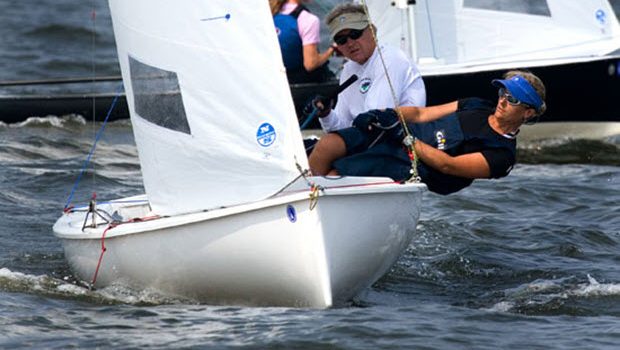
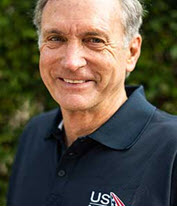


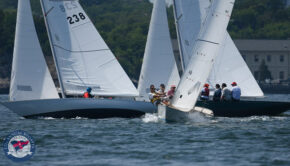
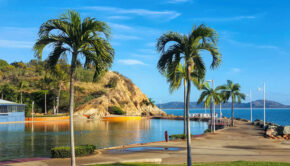
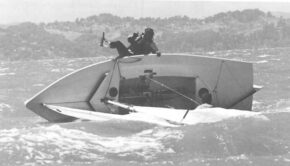
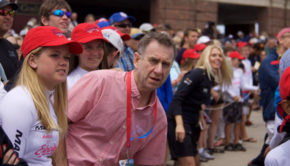
 We’ll keep your information safe.
We’ll keep your information safe.